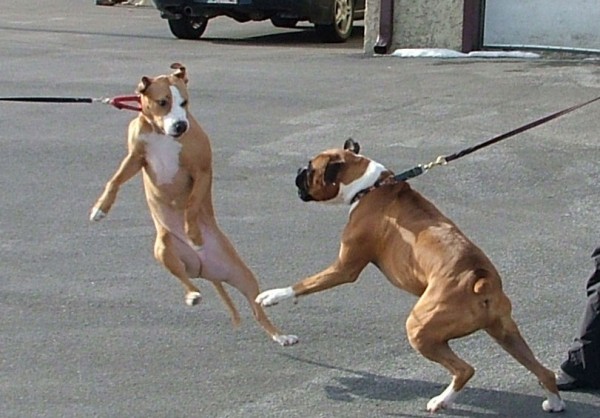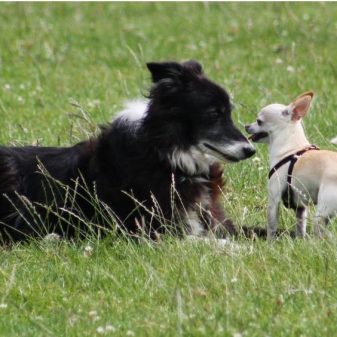- You cannot add "Dog Behaviour Science" to the basket because the product is out of stock.
Treating Dog Dog Reactivity for Professional Dog Trainers
€799.00
Description
This course is a thorough programme to equip learners with the knowledge of how to professionally treat dog to dog reactivity in your clients dogs.
As this is the most common serious behaviour problem seen in dogs in Ireland, the ability to handle these cases effectively will very much increase job satisfaction in the trainer, and help many dogs and their owners live a much happier life.
**THIS COURSE WILL BE BUILD ON YOUR CORE AREA OF COMPETENCY QUALIFICATIONS AND WILL BE SUFFICIENT TO START BUILDING YOUR PROFESSIONAL EXPERIENCE HOURS REQUIRED TO APPLY TO THE IAABC TO BECOME A CERTIFIED DOG BEHAVIOUR CONSULTANT**
Delivery
The programme is delivered via online video based lectures. Each lecture will have an accompanying online exam.
Students can take the programme at their own speed.
Assessment
One online exam per module
One at-home written exam
Dates
This course will begin May 2nd
Cost
€799
Tutor
Your tutor on this course will be Nanci Creedon M.Sc. CDBC. Nanci has a degree in Zoology and a master’s degree in Animal Behaviour. She is a certified dog behaviour consultant (IAABC and AABP) and also a certified pet dog trainer (APDT Ireland and CCPDT-KSA).
Enrolment Criteria
This course has been designed for students who have already become qualified dog trainers.
Out of stock
Description
Module 1: Differential Diagnosis of Dog Dog Reactivity
Differential diagnosis is the process of differentiating between two or more conditions which share similar signs or symptoms. It is important you correctly diagnose the type of dog to dog reactivity prior to initiating treatment. Is it fear based? Frustration? Play? Pain? Or something else?
Module 2: Medical Differentials for Primary Presenting Behaviour
Does this behaviour have a medical cause? What signs and symptoms should you look for? How should you communicate with your clients vet?
Module 3: Initiating Factors of Dog Dog Reactivity
How did this behaviour develop initially? This is important as your client will want to know why their dog is behaving in this manner to decrease their frustration toward their dog, and increase their sympathy for their dog.
Understanding the many ways this behaviour can develop is important professionally so that, while working with younger dogs, you can avoid the development of the behaviour.
Module 4: Maintaining Factors of Dog Dog Reactivity
Maintaining factors will continue to fuel the unwanted behaviour. Helping your client to understand how seemingly insignificant factors are causing the dog dog reactivity to remain and often increase is essential so that they can understand how to approach behaviour management holistically.
Module 5: Using First Aid and Management to Reduce Risk
Dog dog reactivity can be a very serious behaviour condition posing serious risk to dogs and humans alike. It is important to give your clients first aid and management advice prior to seeing your client face to face to increase safety.
We will discuss how to conduct the initial phone call, how to deliver first aid advice professionally, and how to ensure your client has understood your advice.
Module 6: The Consultation Process and Report Writing
Developing a thorough and well thought out consultation and report writing process will mean that you minimise the probability of missing out on any important information gathering stage, and create easy to follow, thorough reports in an efficient and time efficient manner.
Module 7: Behaviour Modification Treatment and Reactive Rover Workshops
There are different ways to treat dog dog reactivity, and equipping your tool box with lots of different methods to address the behaviour will mean that you can customise your treatment plan for each case individually.
Are group classes going to form a part of your behaviour modification treatment? We will discuss how to conduct a reactive rover workshop minimising the risk to dogs and clients alike.
Module 8: Practical Cases and Client Education
To develop your skills and ability to work with clients in a ‘real life’ manner it is essential that you gain experience by observing real life consultations. This module will cover four real life cases, from initial consultation to behaviour observations, treatment plan and the first practical training session. A real life consultation and training session will never 100% go to plan, so observing real life cases will help you build your ability to go with the flow, think on the spot, and work with what you have been given to get the best for your client and their dog.
**Graduates will be welcome to come to Creedons College centre and sit in on dog dog reactivity consultations upon successful completion of the programme if they so wish.**




